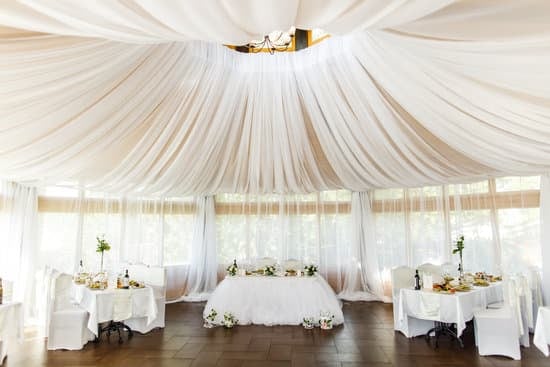When do wedding invites get sent out? Sending out wedding invitations is a crucial element in the planning process of any wedding. These invitations not only provide guests with essential event details, but they also set the tone for the entire celebration. From the design to the wording, every aspect of the invitation sends a message about the style and formality of the event.
The timing of sending out wedding invites is an important consideration that can impact attendance and overall guest experience. It’s important to adhere to a standard timeline when it comes to mailing these invitations, as well as consider various factors that may affect when the ideal sending date should be.
In this article, we will delve into everything you need to know about sending out wedding invitations. From understanding the standard timeline to determining the ideal sending date based on different factors, we will provide you with comprehensive insights and tips on creating and designing your invitations.
Additionally, we will discuss important details to include in the invites and how to handle responses and guest count. Whether you’re wondering when to send out second round invitations or who should be on your guest list, this article has got you covered.
The Standard Timeline
When it comes to planning a wedding, sending out the invitations at the right time is crucial. A well-planned timeline for sending out wedding invites can ensure that your guests have enough time to make necessary arrangements and RSVP in a timely manner. Here’s a suggested timeline for sending out wedding invites:
- Save the Date Cards: Send out save the date cards 6 to 8 months before the wedding date, especially if you are having a destination wedding or if many of your guests will be traveling from out of town.
- Wedding Invitations: Send out formal wedding invitations 8 weeks before the wedding date for local guests, and 12 weeks in advance for out-of-town guests to allow them ample time to make travel arrangements.
- RSVP Date: Request that your guests RSVP by a specific date, typically 3-4 weeks before the wedding. This will give you enough time to finalize details with vendors and the venue based on the final guest count.
It’s important to note that these timelines are just suggestions and can be adjusted based on specific circumstances such as holiday weekends, peak travel seasons, or if you’re having a large guest list.
In some cases, couples may opt to send their invitations even earlier than recommended, especially if they are hosting a destination wedding or a significant number of their guests will need to travel. Keeping these factors in mind when deciding when do wedding invites get sent out can help ensure that your guests have sufficient time to plan and respond.
Factors to Consider
When it comes to sending out wedding invitations, it’s important to consider a variety of factors in order to determine the ideal sending date. One of the first things to consider is the location of your wedding and where most of your guests will be traveling from. If you have many out-of-town guests, you’ll want to give them plenty of time to make travel arrangements, so consider sending out invitations earlier than the standard timeline.
Another factor to take into account is the season or time of year that your wedding will take place. For weddings held during peak travel seasons, such as holidays or summer vacation, it’s a good idea to send out invites earlier to ensure that your guests can reserve accommodations and plan their trip accordingly.
Additionally, you’ll want to consider any major events or holidays that may coincide with your wedding date. Sending out invitations too close to other major events may result in lower attendance, so it’s best to avoid these dates when choosing the ideal sending date for your wedding invites.
Furthermore, keep in mind the production time for your invitations. If you’re opting for custom-designed or handmade invitations, you’ll need to account for the time it takes to create and print them before they can be sent out. Ultimately, determining the ideal sending date for your wedding invites requires careful consideration of these various factors in order to ensure that your guests have ample time to make plans and RSVP accordingly.
Tips for Creating and Designing Your Wedding Invitations
When it comes to creating and designing your wedding invitations, there are several important factors to consider in order to make a lasting impression on your guests. Your wedding invitation sets the tone for your special day and gives your guests a glimpse of what to expect. Here are some tips for creating and designing your wedding invitations:
Choose a Style That Reflects Your Wedding Theme
One of the first things to consider when creating your wedding invitations is the overall style and theme of your wedding. Whether you’re having a formal black-tie affair or a casual beach wedding, your invitation should reflect the tone of the event. Consider using colors, fonts, and imagery that align with the theme of your wedding for a cohesive look.
Personalize Your Invitations
Make your wedding invitations personal by including details that are meaningful to you as a couple. This could include incorporating elements such as monograms, custom illustrations, or even a specific quote or saying that holds significance to you both. Personalizing your invitations adds an extra special touch that will be appreciated by your guests.
Pay Attention to Details
When designing your wedding invitations, pay attention to the finer details such as paper quality, printing techniques, and envelope style. These details can make a big impact on the overall look and feel of your invitations. Consider working with a professional stationer or designer who can help guide you through these choices to ensure that every detail is carefully considered.
By following these tips for creating and designing your wedding invitations, you can ensure that they accurately reflect the style and tone of your special day while also capturing the attention of your guests.
Who Should Be on Your Guest List
When it comes to creating a guest list for your wedding, it’s important to consider the etiquette of sending out invitations. This involves making careful decisions about who to invite and when to send them out. One key factor to keep in mind is the relationship between you and your potential guests. Close family members, friends, and colleagues may be given higher priority on the guest list compared to more distant acquaintances.
Another consideration for the guest list is the overall size of your wedding. If you are planning a smaller, more intimate ceremony and reception, you may need to be more selective with your invites. On the other hand, if you have a larger event planned, you might have more flexibility in extending invitations to a wider group of people.
In terms of when invitations should be sent out, traditional wedding etiquette dictates that save-the-dates should be sent 6-8 months before the wedding, followed by formal invitations 8-10 weeks before. However, this timeline can vary depending on factors such as the location of your guests (local vs. out-of-town), whether they will need to make travel arrangements or take time off work to attend your wedding.
Therefore, it’s important to consider these factors when determining when do wedding invites get sent out.
| Wedding Invitation Timeline | Etiquette Recommendations |
|---|---|
| Save-the-Dates: 6-8 months before | Potential guests are notified well in advance |
| Formal Invitations: 8-10 weeks before | Time for guests to RSVP and make necessary arrangements |
Communicating Important Details
When it comes to wedding invitations, it’s essential to communicate important details clearly and effectively. This section will discuss what crucial information should be included in the invitations to ensure that your guests are well-informed and prepared for your big day.
Basic Details
The first and most crucial information to include in your wedding invitations is, of course, the basic details of the event. This includes the date, time, and location of the ceremony and reception. Make sure to double-check these details for accuracy before sending out the invitations. You may also want to consider including a map or directions to the venue for out-of-town guests.
Dress Code
It’s also important to communicate the dress code for your wedding. Whether it’s a formal black-tie affair or a casual outdoor event, make sure to clearly indicate the expected attire on the invitation. This will help your guests feel comfortable and appropriately dressed for the occasion.
RSVP Information
Be sure to include a method for guests to RSVP to your wedding, whether it’s through a traditional response card or online through a wedding website. Include a deadline for RSVPs so that you can get an accurate guest count for your event. Additionally, if you have meal choices or special requests, such as dietary restrictions, make sure to include that information on the response card as well.
By including all of this important information in your wedding invitations, you can ensure that your guests have everything they need to prepare for and attend your special day.
Responding to RSVPs
Once your beautiful wedding invitations have been sent out, the next step is to wait for the responses to start rolling in. However, it’s essential to have a plan in place for handling these RSVPs and managing the guest count for your special day.
The standard etiquette dictates that wedding invites should be sent out 6-8 weeks before the big day. This provides guests with ample time to make arrangements and RSVP. When do wedding invites get sent out also depends on whether you are having a destination wedding or if many of your guests will need to travel long distances to attend.
Upon receiving RSVPs, it’s crucial to keep track of each response promptly. This involves creating a detailed guest list with categories such as “Attending,” “Not Attending,” and “Pending Response.” Additionally, some couples find it helpful to set up a digital RSVP system or designate a specific email address or phone number for responses. This streamlined approach can help in keeping accurate numbers and meal preferences organized as well.
| Wedding Invite Sending Timeframe | Details |
|---|---|
| 6-8 weeks before the wedding date | Standard timeframe for sending out invites |
| 3 months before the wedding date |
Sending Out Second Round Invitations
After sending out the initial round of wedding invitations, it is common to experience a decline from some guests due to various reasons such as prior commitments or travel constraints. That’s where the necessity of sending out second-round invitations comes into play. Here are a few tips on how to handle this situation and what to consider when sending out these additional invites:
- Assess your guest list: Before deciding who to send second round invitations to, carefully consider your guest list and prioritize those who are most important for you to have in attendance. This may include close friends, family members, or other loved ones who initially may not have made the cut for the first round of invites.
- Plan ahead: It’s crucial to plan well in advance for sending out second round invitations, especially if there is a shorter timeline between receiving RSVPs from the first round and needing to send out additional invites. Take into consideration printing and mailing time, as well as any potential delays that could arise.
- Personalize the invitations: Just like with the initial round of invitations, ensure that your second-round invites are personal and thoughtful. Consider adding a handwritten note or small detail that shows you truly value their presence at your wedding.
When handling second-round wedding invitations, it’s important to approach the situation with grace and understanding. By carefully considering your guest list, planning ahead, and personalizing the invites, you can navigate this aspect of wedding planning smoothly and ensure that all those who are important to you have the opportunity to celebrate your special day with you.
Conclusion
In conclusion, the timing of sending out wedding invitations is a crucial part of the wedding planning process. By following the standard timeline and considering various factors such as the location of the wedding and whether guests need to make travel arrangements, couples can determine the ideal sending date for their invites.
It’s important to keep in mind that wedding invitations should be sent out 6-8 weeks before the big day to give guests enough time to respond and make necessary arrangements.
Additionally, when creating and designing wedding invitations, couples should focus on personalizing their invites and including all necessary information, such as RSVP details and any specific dress code or accommodation information. The guest list etiquette should also be considered carefully, ensuring that those who are invited are indeed included while handling responses and guest counts with thoughtfulness.
Lastly, it’s essential for couples to have a plan in place for how they will handle responses and any potential declines. This may involve sending out second round invitations if some guests cannot attend the initial invite.
By keeping these considerations in mind when preparing and sending out wedding invitations, couples can ensure that their special day is celebrated by all their loved ones. Wedding planning can be stressful, but with careful attention to detail on this important aspect, it can also be an exciting start to a lifetime of happiness together.
Frequently Asked Questions
How Far in Advance Should Wedding Invitations Be Sent Out?
Wedding invitations should ideally be sent out 6-8 weeks before the wedding date. This timeframe allows guests enough time to RSVP and make necessary arrangements to attend the wedding.
Is 3 Months Too Early to Send Out Wedding Invitations?
Sending out wedding invitations 3 months in advance may be considered too early. While it may allow guests ample time to plan, it also runs the risk of them forgetting about the event or misplacing the invitation over such a long period of time.
How Long Does It Take for Wedding Invitations to Arrive?
The time it takes for wedding invitations to arrive can vary depending on factors such as the printing company’s processing time, shipping method, and any potential delays. It’s best to allow at least 2-3 weeks for standard shipping within the same country, and longer for international deliveries. Using expedited shipping services can shorten this timeframe.

I have been involved in marriages for over 20 years helping couples and singles understand more about them.





